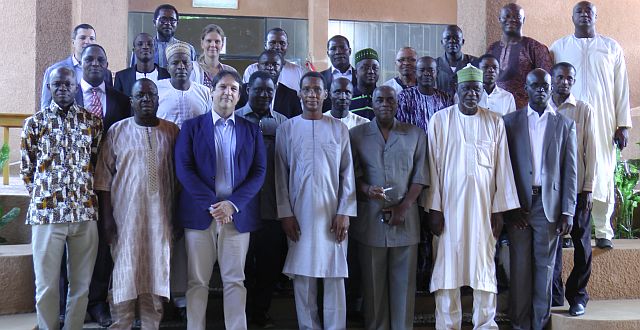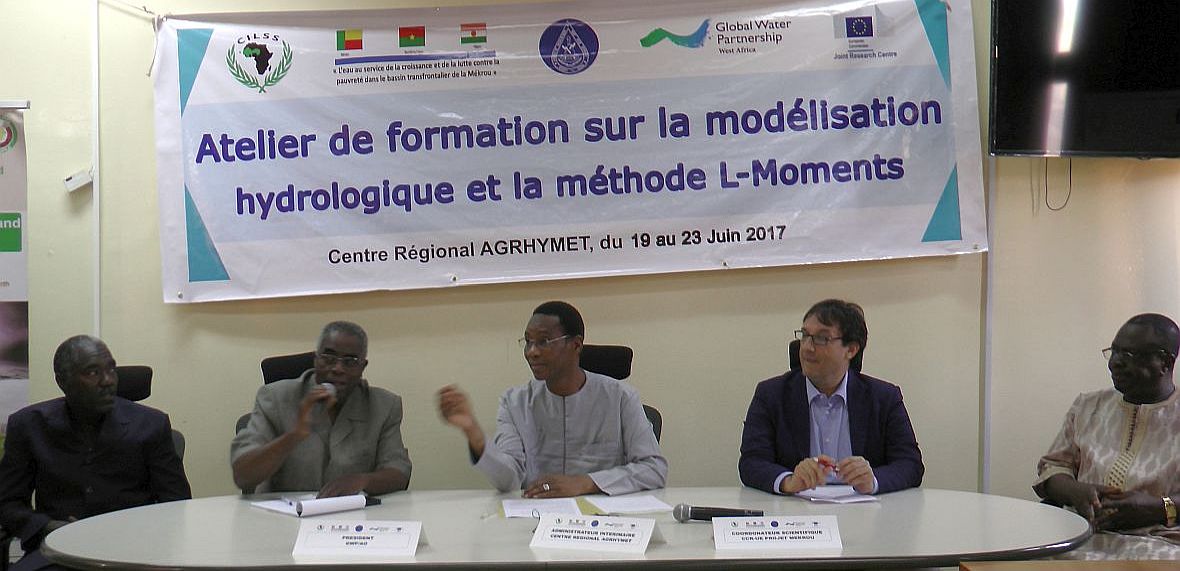The experts and structures from Benin, Burkina Faso and Niger were subjected during 5 days, from June 19 to 23, 2017, to practical modelling exercises in particular the characterization of the Climatic Variability in the Mekrou basin with the L-Moments tool. The second tool, the SWAT, well known to scientists, allows to know the current state of the water resources and to project scenarios on the future evolution of these resources even in areas where measurement on the ground is not available. These are valuable tools for decision-making.
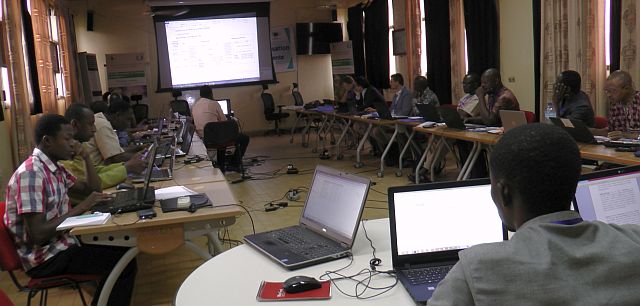 Risk analysis of precipitation / extreme temperatures and their variability can help government to plan and decide, for example, whether an activity / project / investment should be allowed according to the risk zone, or whether an infrastructure should be sized depending on the variability of the climatic variables and the periods of risks coming back. It is an Early Warning System (EWS) tool because it identifies areas of risk and their frequencies but it does not make prediction.
Risk analysis of precipitation / extreme temperatures and their variability can help government to plan and decide, for example, whether an activity / project / investment should be allowed according to the risk zone, or whether an infrastructure should be sized depending on the variability of the climatic variables and the periods of risks coming back. It is an Early Warning System (EWS) tool because it identifies areas of risk and their frequencies but it does not make prediction.
 For Dr. Boubacar IBRAHIM of the Faculty of Sciences and Techniques of Abdou MOUMINI University of Niamey, "these are very interesting tools that will allow us to work even outside the Mékrou basin. As a lecturer-researcher, I see that this is something I can teach to my students who can use it in their masters and theses. It is also up to us to see how to help other services at national level to own these tools ".
For Dr. Boubacar IBRAHIM of the Faculty of Sciences and Techniques of Abdou MOUMINI University of Niamey, "these are very interesting tools that will allow us to work even outside the Mékrou basin. As a lecturer-researcher, I see that this is something I can teach to my students who can use it in their masters and theses. It is also up to us to see how to help other services at national level to own these tools ".
The use of these tools provides information on trends in climate, water resources, with the most appropriate scientific options. These things are necessary to better guide decisions.
"This project is a great opportunity to develop and implement tools and to strengthen the capacities of a certain number of actors to take ownership of these tools. It is an experiment that will serve other basins other than the Mekrou basin ", concludes Abdou Ali of AGRHYMET.
Technical opening ceremony
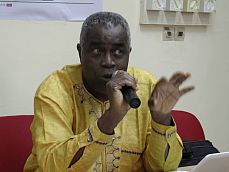 Speaking at the opening session of the workshop, GWP-WA Chair, Prof. Abel AFOUDA said that "this is an important step in the implementation of the Mékrou Project with the mastery of the hydrological model which is a development tool. We know that models are a schematization of what nature itself is, but they allow a thorough knowledge of the watershed and the resource”. He noted that studies have shown that in a context of climate change, 10% reduction in rainfall leads to a 20% reduction in the resource; so it is important to take time to know the resource very well and adapt what is there to the demand.
Speaking at the opening session of the workshop, GWP-WA Chair, Prof. Abel AFOUDA said that "this is an important step in the implementation of the Mékrou Project with the mastery of the hydrological model which is a development tool. We know that models are a schematization of what nature itself is, but they allow a thorough knowledge of the watershed and the resource”. He noted that studies have shown that in a context of climate change, 10% reduction in rainfall leads to a 20% reduction in the resource; so it is important to take time to know the resource very well and adapt what is there to the demand.
Cesar Caramona of the Joint Research Center of the European Union said that this session will make it possible to present the prototype of the E-Water tool that will eventually serve as a decision-making tool after the February meeting which had validated the data and methods to be implemented in the framework of the Mékrou Project funded by the Commission of the European Union. "This week, we will take care of the hydrological aspects and climatic variability so important for the region of the Mékrou basin," he added.
On behalf of the AGRHYMET / CILSS Regional Center, the interim administrator, Mr Samba Ly Souleymane, said that "phenomena such as floods, drought, heat waves have become more frequent and increase the vulnerability of populations". A situation that will continue over the coming decades, according to the Intergovernmental Panel on Climate Change (IPCC). That is why, he said, the development and operationalization of relevant tools to better support climate adaptation strategies must be considered a priority for the development of our countries. Accordingly, he believes that "capacity building of actors at all levels remains one of the main levers to face the development challenge of our region". A mission that the Heads of State of CILSS entrusted to the Regional Center AGRHYMET which coordinates the contribution of the scientific structures to the Mékrou Project.
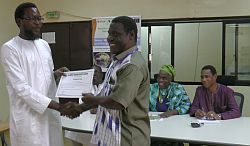 On behalf of the participants in the training, Dr. Moussa SANON of INERA in Burkina Faso, said at the end of the workshop that "the training has reached its goals. The proof is the attendance and interest of the participants in this training. The training showed that these tools were needed and the agreement with the trainers is to continue the refinement in the use of these tools which are pragmatic in helping quick decision-making. "
On behalf of the participants in the training, Dr. Moussa SANON of INERA in Burkina Faso, said at the end of the workshop that "the training has reached its goals. The proof is the attendance and interest of the participants in this training. The training showed that these tools were needed and the agreement with the trainers is to continue the refinement in the use of these tools which are pragmatic in helping quick decision-making. "
All the speakers welcomed the support of the Joint Research Center and thanked the the European Union Commission for funding the Mékrou Project.